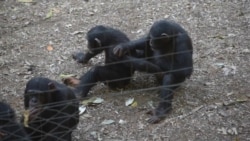For more than 20 years, the Tacugama Chimpanzee Sanctuary in Sierra Leone has taken in chimpanzees orphaned and abused by the illegal pet trade. But the challenges don’t stop there for this endangered species.
On the outskirts of Freetown, chimpanzees at Tacugama swing on ropes and chase each other through the dirt.
Since its founding in 1995, the sanctuary has taken in 77 chimpanzees, victims of illegal wildlife trafficking. The sanctuary is funded by the European Union, several Western zoos, and environmental groups.
WATCH: Sierra Leone's Sanctuary for Trafficked Chimpanzees
For one pet, many chimpanzees die
Willie Tucker is the supervisor of the camp and has been at Tacugama from the start. He says the illegal trade is a brutal business, hurting local ape populations.
“One chimpanzee pet at home means several other chimpanzees would have been killed in the process. … Because in the capture of young chimpanzees in the forest, you must first interfere with the mother by shooting the mother. … You end up killing the mother first, the father, the uncles,” he said.
Tucker says the chimps that survive arrive at the sanctuary malnourished, traumatized, and with bullet or machete wounds.
Never fully wild again
“Basically, this is a rehabilitation program of chimpanzees that were being kept as pets in various homes. ... Sometimes they are living in very bad conditions,” he said. “So when they get here, we make sure that we change their diet slowly. We start training her how to feed on fruit, banana, papaya. ... From there, they go through vaccinations for polio, for tetanus.”
Once healthy, the chimps are socialized with others.
Over time, they are introduced to a fenced-in, semi-wild habitat enclosure where they can forage for some of their own food, mimicking their natural forest lifestyle.
At the edge of this enclosure, Tucker shakes a bowl of peanuts and calls the apes by name.
Soon, the chimps emerge, coming to the fence to gather the peanuts.
“Chimpanzees, once kept as pets, it’s difficult to be released,” Tucker said. “It’s like they have been used to staying with people. It’s possible that even after 20 years or 30 years you send them back to the jungle without any controlled area, they will find their way back to people’s homes.”
Chimp trade falling off
Sierra Leone’s chimp trade has dropped dramatically in recent years, in part because of Tacugama’s outreach programs to teach communities living near forests to leave the apes alone.
David Momoh oversees those programs.
“Since the sanctuary started, we were getting something like five to six chimps a year, but now we are looking at the point we take only maybe one chimp a year,” Momoh said.
There is another threat.
Habitat loss continues
Land has been cleared in the country at such a rate that in 2010, the government was reporting just 5 percent of original forest remained intact.
Now, rapid development is encroaching on these few remaining forests, including in the national park surrounding Tacugama.
“There’s a high increase of urban population increase within the Freetown city and there’s not much space anymore for people to build houses,” Momoh said. “... Everyone has just been coming in and it’s very challenging, so that is why if you move around the forest, there’s a lot of degradation taking place right now, a lot of deforestation happening within the forest, within the protected area itself.”
Momoh says the government must step up enforcement of protected areas to prevent further habitat loss.
But within the confines of Tacugama, at least, the rescued chimps can live in safety.






